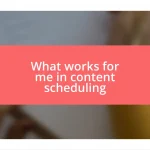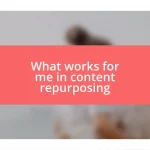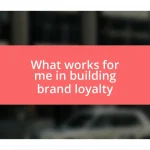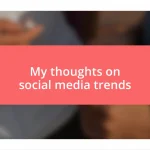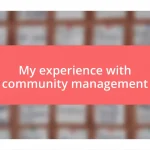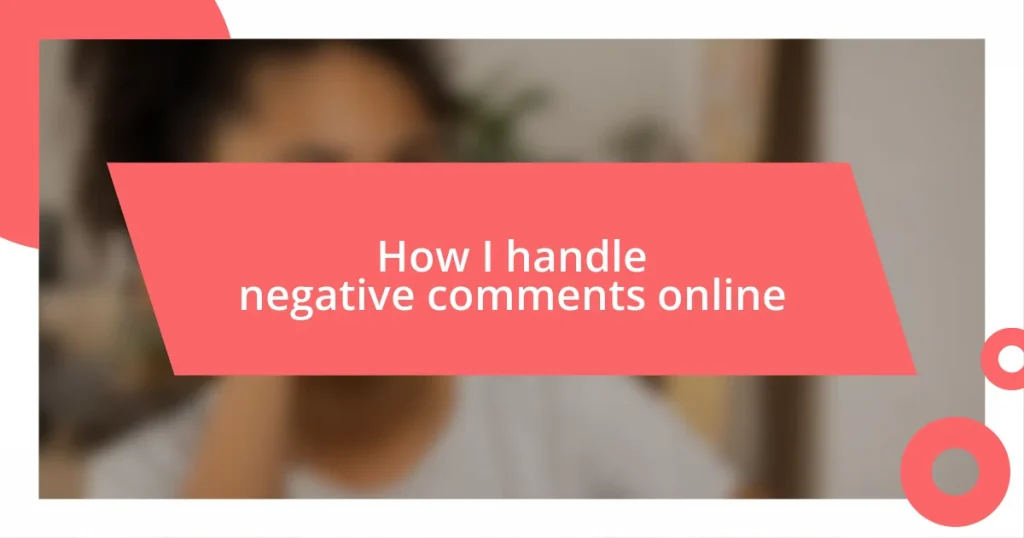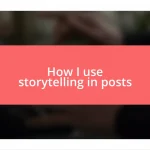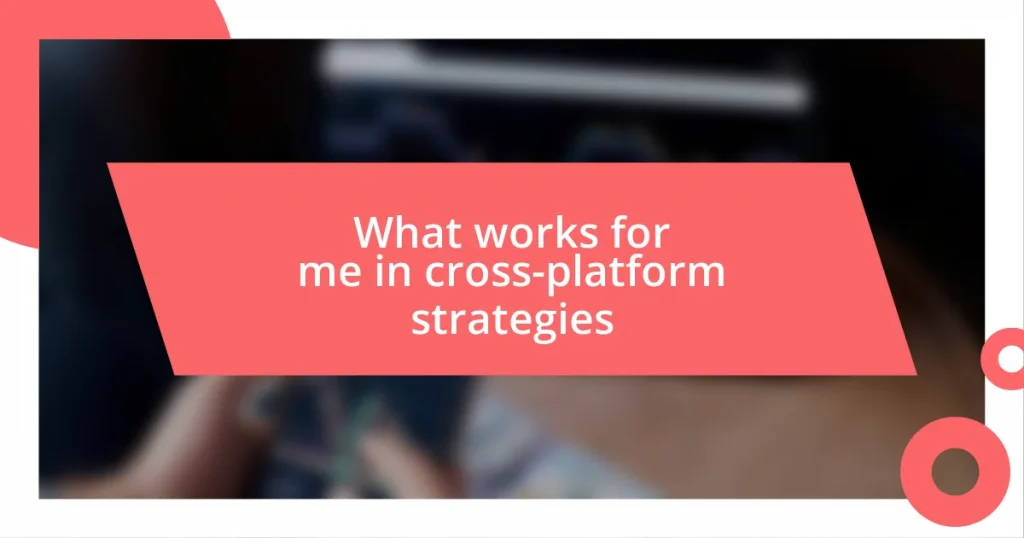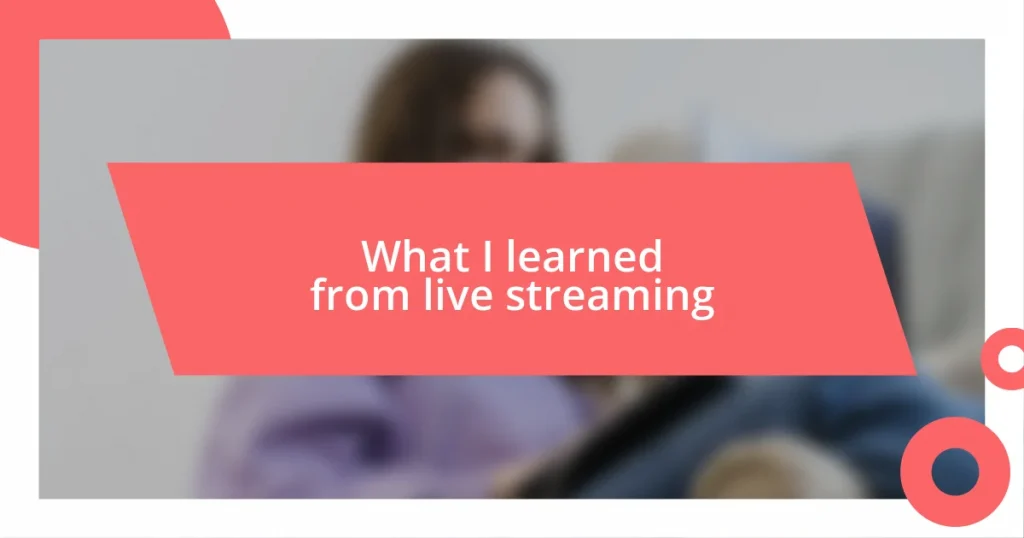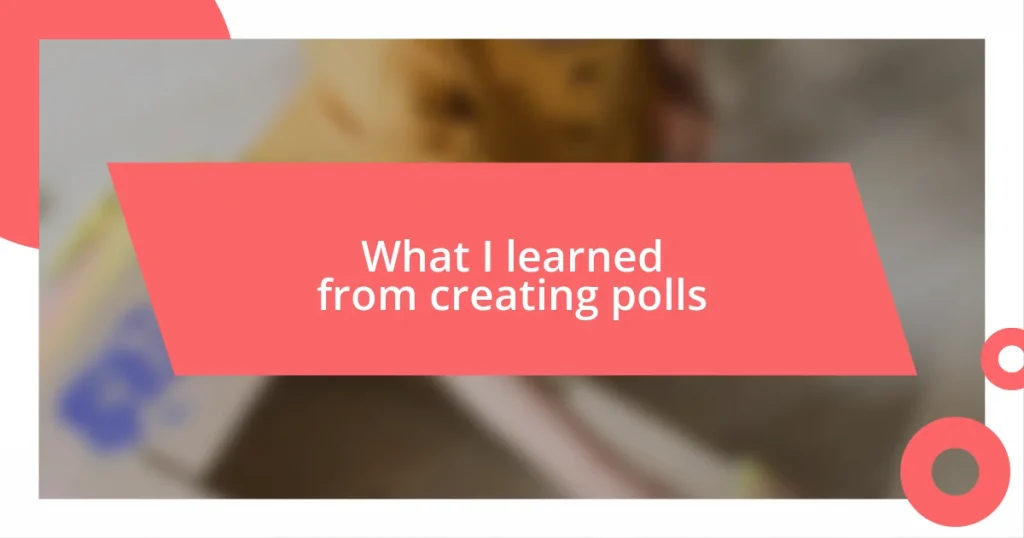Key takeaways:
- Online negativity can significantly impact self-esteem and emotional well-being, but not taking comments personally can help manage their effects.
- Identifying types of negative comments—such as constructive criticism, hateful remarks, and trolling—can aid in determining how to respond effectively and maintain emotional resilience.
- Creating a positive online community involves responding with kindness, setting clear guidelines for engagement, and promoting a supportive atmosphere that encourages vulnerability and collaboration.
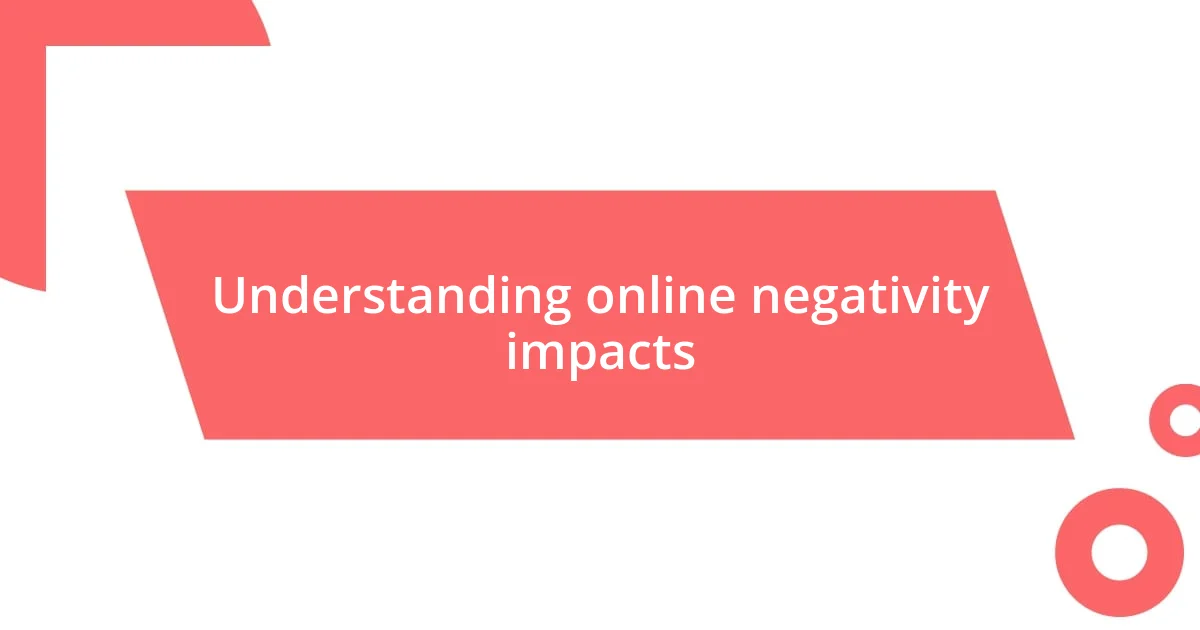
Understanding online negativity impacts
Understanding online negativity can be quite an eye-opener. When I first encountered harsh comments on social media, I felt a mix of confusion and hurt. It’s intriguing how just a few words from a stranger can tap into our insecurities. Have you ever noticed how negative feedback tends to linger in your mind longer than positive remarks? It certainly does for me, highlighting the emotional weight these comments carry.
These interactions often snowball, affecting not just our mood but our self-esteem too. I remember a time when a single critical review on my work made me second-guess my abilities for weeks. It’s almost like that comment overshadowed all the supportive feedback I’d received. It’s powerful how negativity can overshadow all the positivity we’ve built around us.
Moreover, the anonymity of online platforms can amplify this negativity. People might say things they would never voice in person, leaving us feeling isolated. It’s a bit daunting, isn’t it? Reflecting on this, I’ve learned to not take it personally, reminding myself that the anger or frustration expressed in those comments often reflects the commenter’s struggles, not mine.
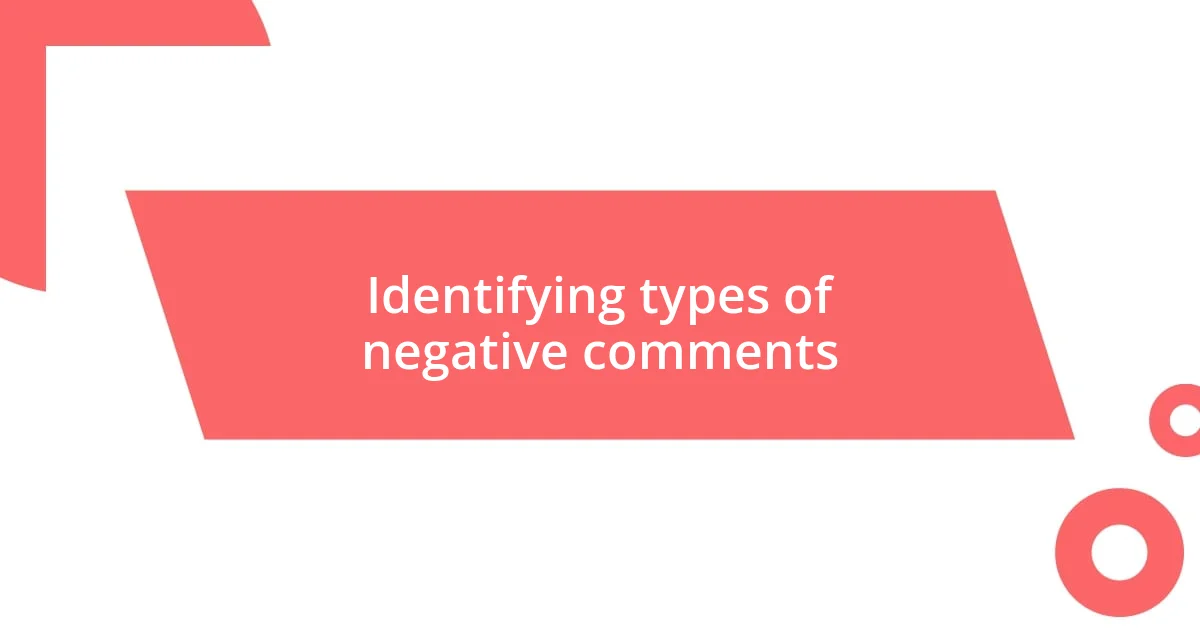
Identifying types of negative comments
Identifying the types of negative comments can help us not just to categorize them but to understand their impact. In my experience, I’ve found that negative comments often fall into distinct categories. For instance, some are simply harsh criticisms about content, while others can be personal attacks that feel like a punch to the gut. It’s like the difference between someone critiquing your work and someone questioning your character. Which one do you think affects you more?
I’ve encountered three main types of negative comments: constructive criticism, hateful remarks, and trolling. Constructive criticism can sometimes sting, but I appreciate the opportunity to learn and improve from it. Conversely, I remember encountering hateful comments that were entirely unfounded; they seemed designed to provoke rather than discuss. Trolls, on the other hand, thrive on chaos, relishing the reactions they provoke. Have you experienced similar types of negativity?
Understanding these categories can make it easier to navigate the emotional storm they create. I find it essential to assess the intention behind the comment. When I take a step back, it often becomes clear which comments deserve my attention and which I should just let slide. Emotional resilience kicks in when I focus on the constructive feedback and disregard the noise meant to destabilize me.
| Type of Comment | Description |
|---|---|
| Constructive Criticism | Feedback that offers solutions or insights for improvement. |
| Hateful Remarks | Personal attacks aimed at diminishing one’s character or value. |
| Trolling | Comments intended to provoke or upset, often lacking substance. |
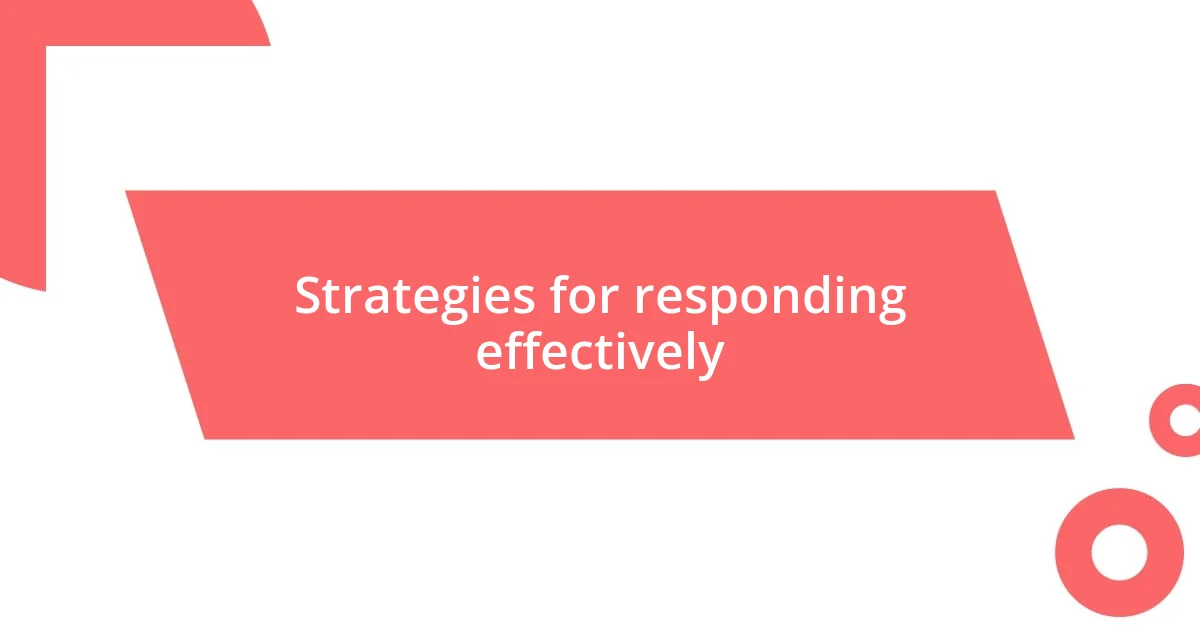
Strategies for responding effectively
When it comes to responding to negative comments, I’ve learned that approach is everything. I usually start by taking a deep breath and reminding myself that not every criticism requires a response. For instance, I recall a time when a follower berated my opinions publicly. Instead of retaliating, I paused, reflected on the comment, and decided that acknowledging it briefly would be more effective than engaging in a heated debate. This allowed me to maintain my dignity while also showing others watching that it’s okay to disagree respectfully.
Here are some strategies that I find helpful for responding effectively:
- Stay Calm and Collected: Before replying, I always take a moment to breathe and gain my composure. Responding in anger often leads to regret.
- Acknowledge and Validate: I occasionally start my responses with a simple acknowledgment, like “I see where you’re coming from.” It shows that I respect their viewpoint.
- Choose the Right Platform: Sometimes, a private message is more appropriate than a public reply. This can prevent a public escalation.
- Focus on the Positive: If the comment has any constructive element, I highlight that part and express gratitude. This not only shows maturity but can also diffuse tension.
- Know When to Disengage: If a conversation turns toxic, I’ve learned to politely bow out. Not every comment deserves my time or energy, and that’s okay.
It’s all about finding the balance between engaging and protecting my peace.
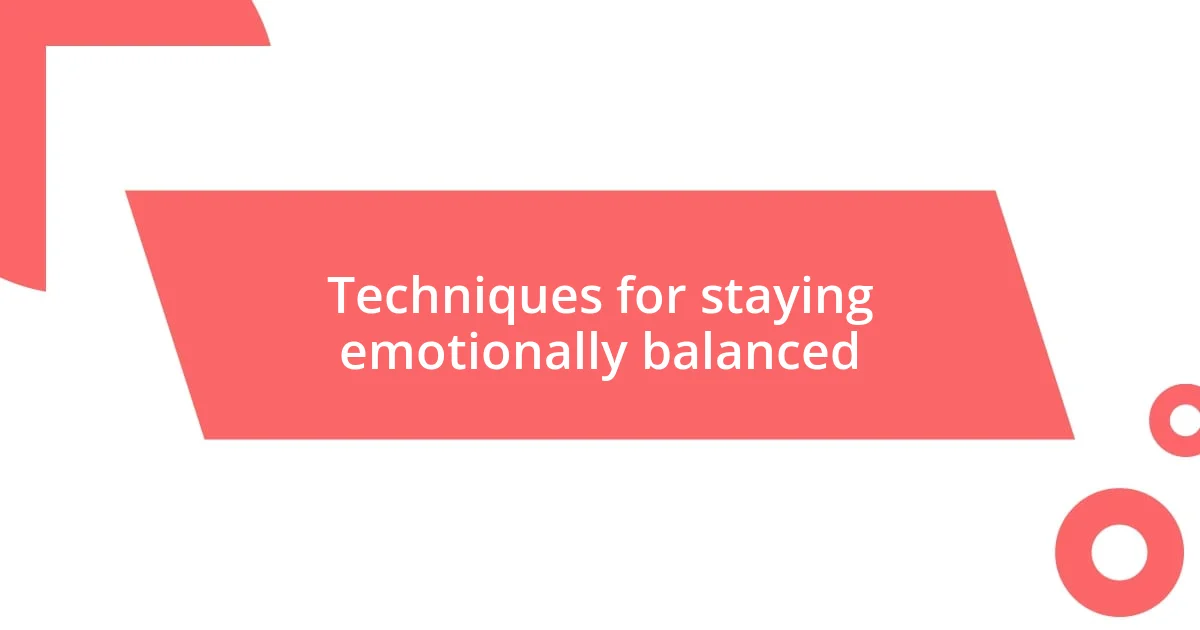
Techniques for staying emotionally balanced
When it comes to staying emotionally balanced, I have a few techniques that have really helped me. One method I swear by is practicing mindfulness. There have been days when I logged on and faced an avalanche of negativity, but taking a few moments to breathe deeply and ground myself made a huge difference. In those quiet moments, I remind myself that the negativity is more about the commenter than about me. How often do we forget to separate our self-worth from someone else’s opinion?
Another technique I use is setting boundaries on my online time. I noticed that spending too much time scrolling through comments was draining my energy and enthusiasm. Now, I limit my engagement to specific times of the day. This way, I can interact when I’m feeling more centered and can process any feedback with an open mind. Have you ever found yourself caught in a cycle of checking for feedback, only to feel worse afterward?
I also make it a habit to seek positive reinforcement. After dealing with harsh comments, I reflect on the supportive messages I’ve received from friends or even follow-ups from my audience. Reading those uplifting messages helps me to reframe my mindset, reminding me that not all feedback is negative. It’s like surrounding myself with a bubble of positivity amidst the chaos. How do you ensure that you stay focused on the bright side amidst negativity?
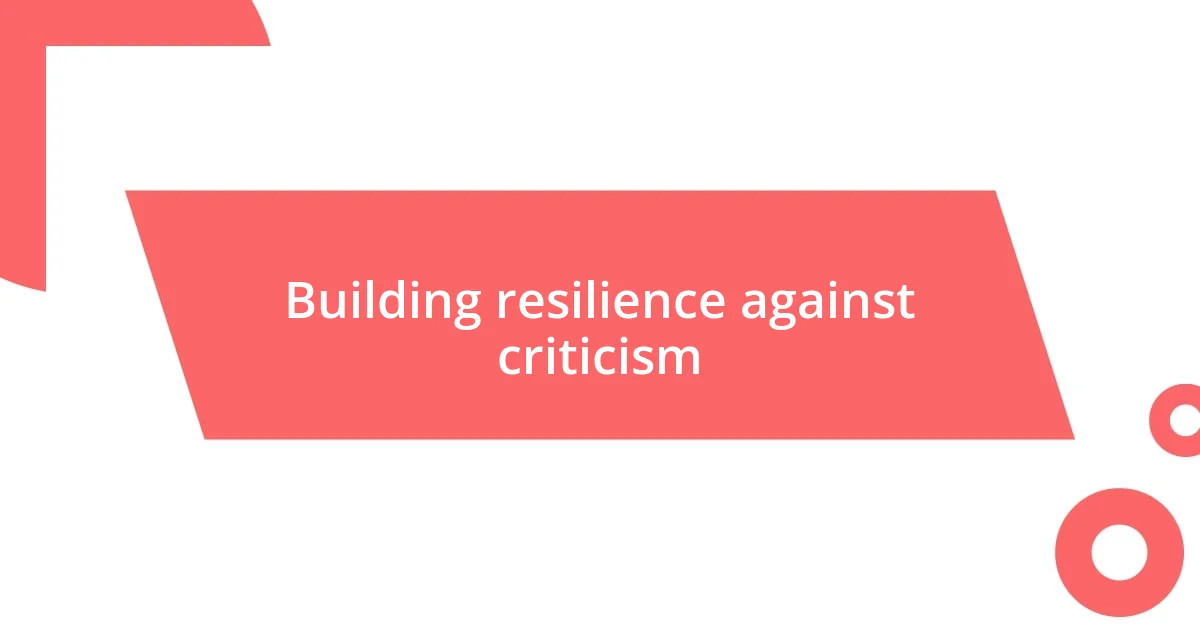
Building resilience against criticism
Building resilience against criticism requires a mental shift that I’ve found to be invaluable. For example, I remember an instance when I received a harsh comment that echoed my deepest insecurities. Instead of letting it derail my day, I reframed the situation in my mind. I asked myself, “What if this perspective is just a reflection of their struggles?” This shift not only helped me gain strength but also reminded me that resilience is often about viewing criticism through a lens of empathy.
I’ve also discovered that surrounding myself with supportive voices can make a significant difference. After confronting negativity, I often turn to trusted friends or mentors. They provide me with a reality check, which reinforces my sense of self-worth. It’s fascinating how a simple chat can illuminate the fact that criticism says more about the critic than it does about me. How often do we allow our self-image to be governed by others? By fostering connections with those who understand my journey, I cultivate a buffer against negativity.
Lastly, I’ve found that embracing a growth mindset fuels my resilience. There was a time I would obsess over negative comments, dissecting each one like a puzzle. Now, I see them as learning opportunities. For instance, if someone critiques my writing, I take a moment to reflect: “Is there a grain of truth here that can help me grow?” This approach not only softens the sting of criticism but emboldens me to evolve. Isn’t it empowering to turn a painful moment into a stepping stone towards improvement?
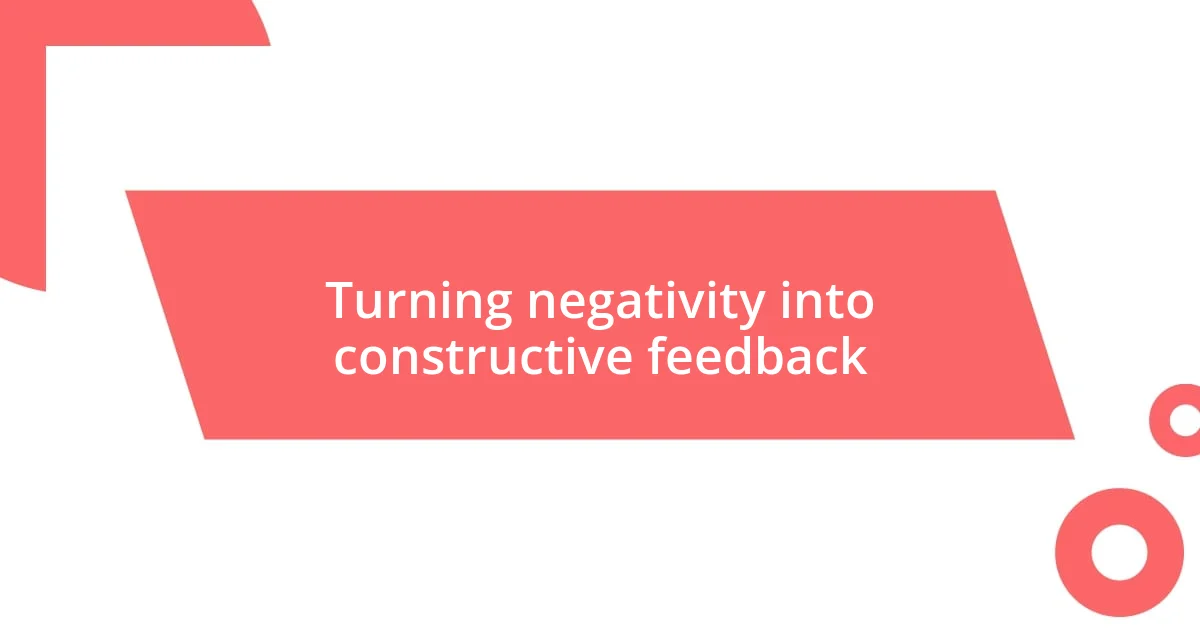
Turning negativity into constructive feedback
Turning negativity into constructive feedback can truly transform the way I approach online comments. I recall a time when someone pointed out a flaw in a project I was passionate about. At first, I felt deflated, but then I stepped back and thought, “What if they’re pointing out something I actually need to address?” I took their comment and created a list of actionable steps to improve. This shift allowed me to see the critique as a roadmap for growth rather than an attack. Have you ever had a moment where feedback actually pushed you toward a breakthrough?
Engaging with negativity often calls for a creative perspective shift. For example, I remember stumbling across a rude comment during a particularly vulnerable moment. Instead of dwelling on the negativity, I asked myself, “What insight could be buried in this harsh message?” This prompted me to engage the commenter for clarification. Surprisingly, our conversation led to illuminating insights that helped refine my approach. Isn’t it interesting how a conversation can distill negativity into something that actually benefits us?
It’s also essential to track patterns in the feedback I receive. There have been occasions when I noticed recurring themes in negative comments about my work. Rather than resisting them, I embraced this as a chance to reflect. It became an unexpected exercise in self-awareness. I started to understand my audience’s perceptions better and incorporated their suggestions into my future projects. Have you ever thought about how repeated feedback might point to a blind spot worth exploring? Ultimately, treating negativity as a tool for improvement rather than a hurdle makes the online landscape feel a lot less daunting.
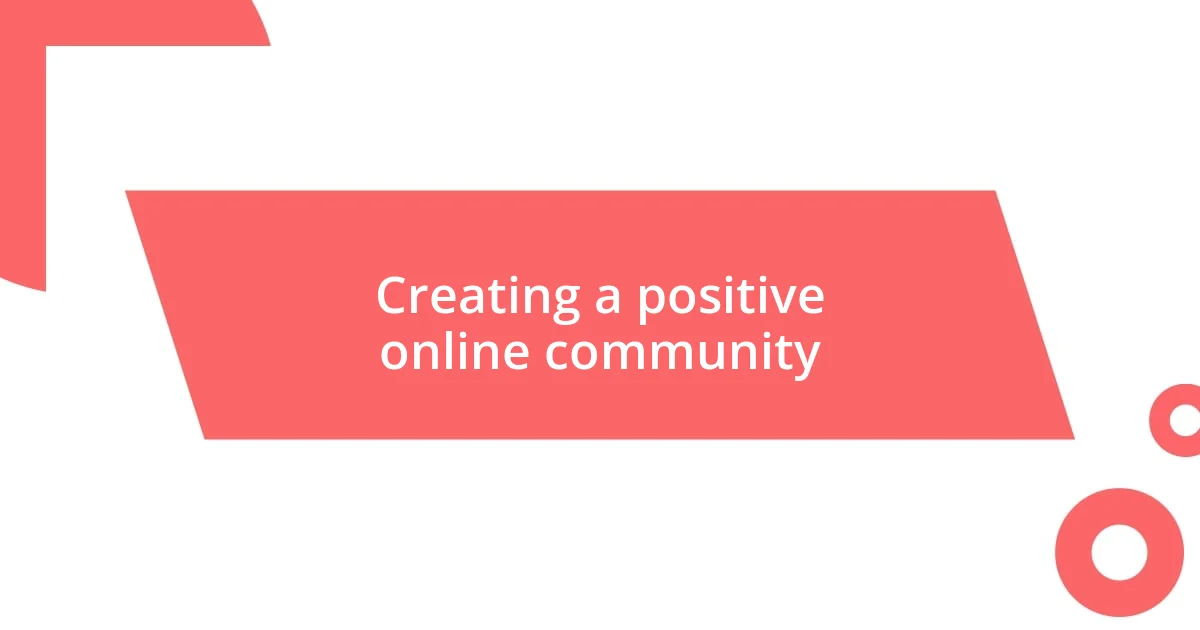
Creating a positive online community
Creating a positive online community hinges on the way we respond to negativity. I once found myself in a heated discussion where a comment threatened to spiral into hostility. Instead of firing back, I took a breath and replied with kindness, asking for the other person’s perspective. That gentle approach transformed the conversation. Isn’t it amazing how a small act of understanding can shift the tone entirely?
Fostering a supportive atmosphere is essential for growth. In my online circles, I’ve noticed how celebrating every little success encourages others to share their achievements without fear. There’s this great sense of camaraderie when I share my own highs and lows, creating a space where vulnerability is welcomed. It’s like forming a tribe that thrives on collective encouragement instead of judgment. Have you felt that warmth radiate through your interactions online?
Additionally, I believe that setting clear guidelines can prevent negativity from taking root. When I started my community, I established a few simple rules centered around respect and empathy. It was fascinating to see how this framework not only deterred trolls but also cultivated rich discussions. I often reflect on how the tone we set influences the collaboration that follows. So, what do you think would happen if more online spaces embraced this idea of intentional positivity?



